#the author's barely disguised themes and messages
Explore tagged Tumblr posts
Text
Horror Movie Metaphors Expansion
Yeah, it turns out I'm not done. In fact, I kinda hate my last post because I don't feel like I explained myself well.
First, one little thing I forgot to add to the Wolf Man review; I feel like one reason, among many, why Whannell's The Invisible Man reboot was more well received was that it was still following the main themes of the original story, it's just that the big thing was a change in the point of view character. The generational trauma themes present here are more or less nowhere to be found or at least out of focus in the 1941 original. (Heck, you can argue this whole films owes more to the 2010 Benicio Del Toro version). The original's main conflict was inspired by screenwriter's Curt Siodmak's experiences in Nazi Germany. Which, given the current political climate now, sounds like the kind of movie we need again.
Okay, that's sorta the problem right there. I felt like I came down unnecessarily on Whannell and the other people who made this. The freakin' denouement made it sound like I was critical of them actually adding a real world subtext at all! I meant to say I was concerned about how this trend neuter their fantastical elements to make their pretty clear subtext that much more obvious. The problem isn't that the themes are there or they wanted to spell them out more.
Making it more clear seems to risk making the movie hold up less in re-watches. Think of your favorite pre-2010 sci/horror movie of all time. You listen to what the intentions the filmmakers meant with what they're saying, what people took from it when it came out, what analysts and critics said years later, and then what fans on social media (people likely fitting into a different demographic then the assumed target audience) took from it long after that. Are all of these groups having the exact same takeaways from it? Chances are, at least one of them is an outlier. If all of them have different takeaways, that would mean the film's a disaster right? Not necessarily. Art's funny like that.
So does that sound like "Death of the Author" is needed to make an actual classic? I'd take it on a case by case basis, but I believe in general, I'd see it not as a final test to guarantee if a film is good or not, but more a perspective to use or avoid on re-watches. Unless it's spreading or benefiting a hateful message, it shouldn't be that easy to dismiss or hold onto a movie you like. What you feel about it can be different than how you felt 10 years ago, and how you'll feel 10 years later could be different from both.
I implied this in my original post, but I think the real measure of effectiveness is the filmmaker's passion in pushing the subtext. I mentioned extreme wonder and anger, but that can apply to extreme sadness, humor, etc. Cause that feels like their unique voice and emotion on this. It's certainly less effective if it sounds like their talking down to you or doing the bare minimum to be called "deep". That's the cause of my original excitement for this trend. Filmmakers who otherwise wouldn't touch high concept storytelling before, found a way to seriously engage with it. But now it can feel even that could run it's course.
What am I saying? As if Horror as a genre is in any real danger of growing stale right now. I got a backlog of 70 horror movies to watch (most of them less then 15 years old) all year along, and it has roughly been a 70 movie long list the six years! Feels like everyone making horror movies now. If something gets stale for people, chances are, someone else did their own thing that same year and that will be the new hotness for a while!
Maybe my concerns lie with other genres. Sci-fi, especially. Here's an example of a trope you don't see that much anymore for better or for worse (established IPs excluded); rubber forehead aliens. Basically, most of your Star Trek aliens. At the time, if you wanted to tell a story about 20th century concerns but through a safe sci-fi lens, disguising the Russians or the Nazis or ...well black people as these guys with forehead bumps or extra hair or spots can get it pass through networks less likely to take risks and to people who would otherwise avoid stories that could tackle sensitive topics. Certainly led to a lot of classic 60s TV and beyond. X-Men too for that matter. And while Star Trek, Doctor Who and such can stick to those tropes because, that's kinda how they always did it and the fans and people with passing familiarity with them expect it, good luck getting a new sci-fi show to try it. You sure as shit didn't see them in The Expanse.
I get it. In a world that has taken steps for more representation and talking about these different groups of people (and how now things about to be a lot worse for all of them), why waste time beating around the bush?! In fact, it's clear a lot of supposed fans weren't getting it for years and when you try to point it out to them, they yell at you to stop trying to make it "woke" or try to make excuses that it was "subtle". So yeah, I do want to leave aliens or robots representing [blank] behind, personally. It doesn't seem to be working anymore. You can literally just do bog-standard white savior narratives in front of large swathes of people, if you just make their alien planet look pretty enough. It's all they actually care about.
Side note: That was always my big beef about Avatar. When I first head about it, the idea of piloting an artificial alien body to communicate with a species truly alien sounded very interesting. So imagine the deflation I felt when I saw not only how uninspired the creature design was, but so was the storytelling. Actual Dances with Wolves was a more interesting movie to me then this was!
But I feel likes what's lost isn't what the rubber forehead alien is supposed to represent to us, but what they represent to the other characters in the story. As facts come in, it's becoming clear none of us are going to see humanity contacting alien species in our lifetimes. If humanity makes it long enough to encounter any other sapient races at all. But the exercise in someone coming up with a very different race of people, having their own civilizations, making their own scientific progress, their own history. Independent of humans. Thinking about that would be like. And how they would compare and contrast with us.
The actual speculative part in Speculative Fiction. Imaging a world without, and after us. Whether that us be just you or me or...everyone. That ability, that question asked to be shared with the reader, listener, or watcher. That's what I worried about losing. Because now, everyone's going to be thinking about the present. And if you don't like the present, how are you going to get out of it if you don't have an idea beyond it or with only one step removed from it?
I was wrong. It wasn't just an anti-capitalism post. It's an anti-doomerism post. Well, horror's about doom in one way or another so of course it works fine. It's like the court jester of genres; the ones on top aren't actually taking it seriously, but it is bringing the best entertainment and is the only one saying the quiet part loud. Now if only the rest of the court stops laughing, actually listens, and grows the spine to wave their own freak flag. Fat chance.
1 note
·
View note
Text
Mini Review: ‘Wonder Woman: Earth One’ by Grant Morrison
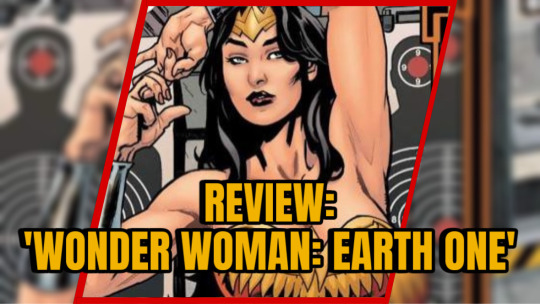
Wonder Woman: Earth One’s core themes of feminist revolution in a male run society, and its general progressivism with being a mainstream mega popular character, i just cannot ignore how god damn fascist this book is. grant morrison clearly did not know how to comment on how the amazonians way of “love by force” is no different than a violent society, men still have no agency in their book, it really is just childish reverse sexism. instead what we get is basically akin to a nerd incapable of removing his fantasies from his politics, sexy sci-fi/mythological fascist women who use lesbian BDSM to cure naziism. truly genius ideals, who needs to arrive at conclusions by intellectualism? i do understand showing love and compassion is the way to help people understand your cause, but we do all understand the difference between that & ‘The Authors Barely Disguised Fetish’, right? it’s frustrating because i want to enjoy this book for its progressive ideas, but it feels more like moral luck than actual spine, no real commitment to ideals or rational conclusions based on values, just vibes.


beyond this though, Diana is a very wishy washy character, while i do like that she faces conflict, something that bugged me is that it feels like it all just rolled off her back. to some degree Diana should be an all powerful being, but i didn’t really pick up even a scent of long term remorse over the death of her mom. she doesn’t really grow, she turns from a curious rebel to a feminist icon party girl. riveting, truly riveting. and look, i earnestly don’t mind stories about vapid girls who do drugs and drink to soil their brains, lord knows i love reading about myself, but i don’t really feel like we committed to any angle here, she existed as the story needed her to, not as a real woman.

ultimately the kicker here is this is feminist literature that does not respect women or view them as beings with true agency, they are plot devices or they are comedic fetish material, that is the purpose they serve here, and it’s embarrassing the message it tries to force down your throat while not understanding what it preaches in the slightest. big let down, as someone who’s never read wonder woman before, this feels like it was certainly a bad start, even if i did enjoy it a little mindlessly at times. entertaining if you can just shut your brain off entirely, but it does not hold up under the merits of even a little ideological scrutiny. the ‘i’m a male feminist’ of comics.

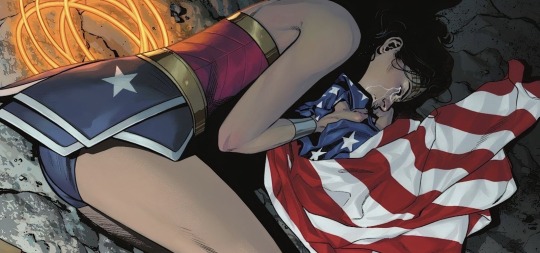
#wonder woman#dc#dc comics#comic review#wonder woman earth one#2010’s#feminist#feminist review#grant morrison
1 note
·
View note
Text
Chrome’s Shadowgast Fic Rec List, Vol 2
Alright, as threatened, it’s time for another list of fic recs, since you guys keep churning out absolute bangers. If you missed the first list, check it out here.
As before, the rules:
I’m limiting this list to one fic per author (but may repeat some authors from list #1.) I also link author profiles, so please check out their other fics as well!
These are MY personal favorites. That means if you reply “you’re wrong because you missed X”, no I’m not.
Without further ado, (More of) My Favorite Shadowgast Fics:
* = fic is rated M or E��
Dunamancy 101: The Practical Application of Romance Upon Two Unsuspecting Wizards by Dragonslaeyr
Professor Caleb Widogast and Dr. Essek Thelyss' students just wanted a break from the sheer amount of assigned readings they had. As it turned out, both professors were single.
Events escalated from there.
It’s epistolary! It’s outsider POV! It’s a university AU! It’s literally everything you love! This fic is hilarious, heartwarming, and brilliantly rendered in the form of syllabi, chat messages between Essek and Caleb’s students, emails, and Rate My Professor reviews.
Refuge by kae_hunter
Essek watches Caleb languidly through the lashes of his usable eye. He has unquestionably just endured the worst day of his entire life: his title, his Den, the respect of his Queen, everything he’s worked towards for the past half-century, crumbled to dust in an instant. Adding injury to insult, he barely survived the two separate ambushes set by his former colleagues long enough to deliver himself as a warning to possibly the only people who might avert the impending apocalypse. In the past half hour, he has been repeatedly (and very painfully) jolted to and from the brink of death like a child’s yo-yo. And yet...
And yet, seeing this human’s face—this foreigner, who, not so long ago, he might have imprisoned or killed as “Empire scum” without a second thought—the tender studiousness of Caleb Widogast’s expression, as he gently dabs at Essek’s eyelid with a damp cloth... Essek finds himself strangely at peace with it all.
This is an older one--to the point where it’s not canon compliant anymore--but still 110% worth a read. The author has wonderfully vivid language and a superb blend of emotion and humor (and Yussa’s appearance is a ton of fun).
Hard Mouth* by road_rhythm | @road-rhythm
There's something in Caleb's dreams. It wants him to know that he's not alone. It wants him to know that he'll never be alone again.
Elves don't dream, so all Essek can do is watch.
A long canon-divergence fic that assumes Caleb didn’t take Mind Blank has his eighth-level spell and Trent Ikithon played a longer game in trying to take him down. If you’re looking for the emotional equivalent of getting repeatedly knifed in the gut, this fic is for you! Warning for dark themes; please be mindful.
It used to be if you don’t like it you could leave by thought
In which the humans do a politics, the Xhorhasians learn about potatos, and everyone decides five hundred years of living in disguise and on the run isn't actually a great life plan, Essek.
This fic is an absolutely delightful post-canon Shadowgast epic. It has it all: Essek and Caleb slowly inching their way into a relationship Without Talking About It, while all of Xhorhas is talking about their torrid love affair, with incredible dialogue and a beautiful look at the rest of the Mighty Nein on the side. Can’t recommend this one enough for the thoughtful worldbuilding and warm fuzzy feelings. Also, title is from “Rome” by Dessa, which is a banger.
The Upward Arc of Sun and Moon* by marsastronomica | @marsastronomica
Shadowhand Essek Thelyss of the Kryn Dynasty has been selected to spend the year at the Soltryce Academy, teaching the basics of an esoteric school of magic known as dunamancy. While the goal is to build better relations between the Dwendalian Empire and the Dynasty, it’s also the best way to prove to his mother he is committed to furthering the reputation of their well-regarded Den.
Renowned former adventurer Caleb Widogast has recently been appointed the Archmage of Civil Influence. Beloved by the common folk, Caleb finds himself frustrated with cutthroat peers and a morally lackadaisical aristocracy. Being able to attend every dunamancy lecture, plus new students and old friends, should keep his troubled mind away from unfinished business.
Though Essek and Caleb met three years ago, a misunderstanding put them at odds. The more they talk, the quicker Essek falls into his first romance…which unknowingly leads them both into a web of underhanded machinations.
Oh, man, I can’t say enough good things about this epic-length (seriously, long as hell, and if you’re anything like me you won’t want to stop reading) fic. It’s a gorgeous alternate universe, blending elements of canon with a university AU. The development of Caleb and Essek’s relationship is thoughtful, the dialogue is excellent, and the author even got me to enjoy things that usually aren’t to my personal taste.
Lay Your Bones by LadyOrpheus
Footsteps pad down the hall and past the stairs. Actual footsteps. Verin can’t remember the last time he saw Essek walk on his own two feet. He feels a twisted knot form beneath his sternum; something isn’t right.
Thinking only of justice and restoring his family's honor after Essek's betrayal, Verin Thelyss finds something he never expected, an Essek he never expected. A mission for justice turns into a race against time and a family finds their world upended.
A really powerful blend of kidfic and one of my personal favorite genres, ‘Essek gets arrested by the Dynasty and the M9 save him’. The use of POV is excellent and the characters are written thoughtfully and realistically.
a mirror to the sky* by renquise
Essek shows up on Caleb's doorstep in the bitter cold of winter.
It is still early in the day, barely three-sixteen, but the sun is already disappearing between the city houses, leaving only blue light in the streets. The temperature is falling with the sun and the moons are high in the sky, white and pink shadows against the blue. Essek is dark and indistinct in the doorway, the shape of him muffled by a heavy cloak, and they have need of each other’s complicated company.
As with all of renquise’s fics, this is a beautiful and delicately written fic about intimacy. The dialogue is exquisite, the language and POV is impeccable.
Out of Season* by aboxthecolorofheartache | @aboxthecolourofheartache
Caleb knows what it is to be hunted. He sees it in Essek’s careful placement of his minimal luggage, how he has not unpacked anything more than what is needed at the moment, the modest respectability of his nightclothes, how he sets his boots by the bedroom door instead of on the tray in the foyer.
The Dynasty’s memory is longer than lifetimes, and Kryn lives are already long. Ludinous Daleth keeps fat ledgers. Their quarry will go to ground tonight with his head on Caleb’s pillow."
Another post-canon fic about Essek on the run, and Caleb, and Essek and Caleb together. If you enjoy being punched in the gut by your own emotions, this fic is for you! This fic is so well constructed, and it manages to hurt a lot and be warm and hopeful at the same time.
the fire kept closest (burns most of all)* by mousecookie | @ariadne-mouse
“Okay, you definitely have something new,” Beau said when he stalled for too long. “Spill.”
Essek continued to chew his thumbnail. “Tour group on the lava field. There was a sudden breakout from a soft spot.”
“...And?”
He took a breath, then shrugged. “It looked like hands?”
(Aka, the spooky volcanology AU that absolutely no one asked for.)
The concept of this fic is fucking bonkers but the emotions it will cause you to have are worse! I feel especially compelled to recommend it because It’s Really That Good, No Really, I Swear. Funny and heartwrenching in equal measure.
The Climb by Chekhov | @thechekhov
It’s... the stupidest thing. Essek grits his teeth. It’s a trained habit - a way to redirect some of the pain without showing any symptoms. A Shadowhand never shows his hand, and it is this he excels at - a poker face, a well-concealed illusion of poise and grandeur and tolerance. But today, he is unlucky. Because there is little that escapes the keen mind of Widogast - and here he has quite the disadvantage. It is, quite literally, his least favored terrain. Stairs. ---
When keeping mages in an enclosed terrarium, please keep in mind the following: They need lots of places to hide and explore. Provide enrichment opportunities for them to keep them from getting bored - plenty of books, hidden treasures, and secret chambers. And if you're feeling bold, think about including an Anti-Magic staircase just to challenge them. See what they do with it.
A light-hearted one to end the rec list with; while of course I love Essek and Caleb at their most tortured, have a delightfully funny one with great, snappy dialogue where they’re only at the mercy of their own pride, stupidity, and each other.
And if you’re still on the hunt for more Shadowgast fic, there is my own ouevre, but I will rec my most popular one:
only code it knows is rote survival by Chrome
Essek clung to her; his fingers gripped the front of her coat. He looked small in a way he never had before, frightened in a way that Caleb hadn’t fully processed he could be. It wasn’t Essek’s nervousness, the anxiety of a brilliant man who could see danger all around him, who could see the falling dominoes and the way the web he had woven had entangled him. It was the fear of a small child, or indeed, a stray cat—the fear of a creature trapped in a terrifying world it did not understand.
Essek, brilliant Essek, Essek who believed he could find the answers to everything, unable to understand a thing—the thought of it stabbed at Caleb’s heart.
---
In a world where Trent makes it back to Eiselcross before the Nein do, Essek spends a night under the effects of the Feeblemind spell. Caleb undertakes a duty of care, and the Nein learn how Essek feels about them beneath everything.
#shadowgast#essek thelyss#caleb widogast#cr2#cr#critical role#fic recs#cr fic recs#critical role fic#cr fic
369 notes
·
View notes
Text
From Bridgerton to Hamilton: A History of Color-Conscious Casting in Period Drama
https://ift.tt/2IQI6Ak
Note: This Bridgerton article contains no book or series plot spoilers.
Bridgerton is a unique mix of Shonda Rhimes’ dedication to Black representation on American television and the British period drama tradition. White critics may dismiss this trend as unnecessary “pandering” to Black and POC viewers, but the number of productions designed around reforming all white-casting has increased over the past 10 years—and has only added to the success of the genre. The number one reason driving demand for diverse period dramas is from Black and POC fans of the genre. The impact of seeing an actor that looks like you can’t be measured in ratings or clicks online. Despite facing years of content and fandom overtly or covertly claiming that the universal themes in period dramas are not “for us”; the tide is starting to turn as fans use social media and the power of ratings to ask for more representation.
A quick overview of recent Regency England-set productions leaves much to be desired. Although the 2018 Amazon Prime/ITV miniseries and the 2005 movie adaptations of Vanity Fair left in West Indian and Jewish heiress Miss Schwarz, she is one of many supporting characters. PBS/ITV’s Sanditon, on the one hand, improved representation by prominently featuring Georgiana Lambe. However, her story was a huge disappointment to Black and POC fans who expected her plotline to end happily or at least have her conflicts resolved.
There have been three paths traditionally towards increasing diversity in period dramas: 1) blind casting (also called racebending), where Black and POC actors play traditionally white characters adding original Black characters to existing fictional works, and 2) Own Voices, where Black and POC writers share their own stories. These two are not mutually exclusive, but, in the world of British period drama, the former is more frequently used, as the bedrock of the genre is adapting existing novels and plays by white authors.
The theoretical framework for inclusive casting begins in the world of staging period drama at the theater. In Shakespeare’s day, men played women’s roles as women were not allowed to appear on stage. The genre evolved in later centuries to allow women to appear on stage, but the tradition of having actors who didn’t match the original descriptions remained. This is even true of his history plays where real women royalty were characters. Ira Aldridge in the 1840s was the first Black actor in Britain to play traditionally white roles on stage. Later on, in the 19th century, several stage adaptations of Jane Austen’s works had all-women casts.
Fast forward to 2015, when Lin-Manuel Miranda in Hamilton redefined what it meant to cast inclusively in modern period dramas by using actors descended from slavery and colonialism to play the Founding Fathers. Every aspect of the musical was designed to reframe the existing narrative of early American history. The costume design also reflected the identities of the actor by featuring braids, locs, and textured hairstyles over 18th century white hairstyles. Rap lyrics conveyed to the audience the names, dates, and other descriptions of the Revolutionary War. The old adage that someone must “look the part” to play a biographical role was thrown out the window.
Hamilton proved that many of the old excuses used to sideline diverse period dramas no longer held to be true. Millions of white people listened to the cast album, brought tickets, or streamed the movie on Disney+. UK theater patrons flocked to the West End cast of Hamilton, as well, before the pandemic. Memes, parodies, and more on social media proved that white audiences can conceptualize historical figures as fictional characters while also knowing the real figures looked and acted quite differently. Fans of the show pushed Ron Chernow’s biography back onto the bestseller lists as they wanted to read what really happened.
The first clear impact the show had on the genre of British period drama comes from a mystery. Daisy Coulam, Grantchester’s head screenwriter, cited reading an interview with Miranda as the inspiration behind the exit plotline for James Norton’s character Sidney Chambers. UK crime dramas For those unfamiliar with the series, Grantchester is a mystery procedural based on a series of books about a 1950s crime-solving Anglican vicar by James Runcie. Norton’s exit plotline in Season 4 generated an original to the show character named Violet who was the daughter of a visiting African-American preacher. Violet was an original character who forced the audience to consider that the US civil rights movement indeed reached their treasured vision of the lily-white British countryside. Coulam already laid the groundwork for Violet in earlier seasons by abandoning large sections of the original novel timeline and but keeping the case of the week focused on addressing 1950’s social issues. Fans heavily criticized Coulam’s writing for style and pacing, but her imagination clearly indicates that Hamilton’s proven formula for disrupting established historical aesthetics can just as easily be applied to fictional depictions of the UK’s past as blind casting a biography-based series or depicting real figures of Black British history.
Other period dramas released in recent years share traces of Hamilton’s impact but in a more thematic and less direct different way. Some shows turned real Black British figures into fictional characters. Lina (Stephanie Levi-John) and Oviedo (Aaron Cobham) on The Spanish Princess are composites of Catherine of Aragon’s servants and several famous Black Tudors. Catherine “Kitty” Despard (Kerri McClean) in Poldark Season 5 was a forgotten Black British figure added in to expand the world outlined in the novels. Victoria featured Ira Aldridge (Ashley Zhangazha) mentioned earlier, plus spotlighted the Queen’s adopted daughter Sarah-Forbes Bonetta and Cuffay (C.J. Beckford) as the leader of the proto-socialist Chartists. Lucille Anderson (Leonie Elliott) on Call the Midwife was not mentioned in the original memoirs, but she was added to represent the Caribbean nurses from the Windrush Generation of UK immigrants.
Racebent casting also increased. Dev Patel’s role as the title character in the movie The Personal History of David Copperfield proved that Dickens adaptations could indeed include POC casts without changing the fundamental plot and message. PBS/BBC’s Les Miserables miniseries also extended the Broadway tradition of casting Black actors in traditionally white coded classic literature characters. Hulu’s The Great featured Sacha Dhawan and several Black actors as Russian nobility, politicians, and courtiers.
All of these series, however, carefully attempted to stay grounded in recreating the original source material or invested in faithfully replicating the era they were set in. Bridgerton radically expands upon Hamilton’s formula by divorcing inclusive casting from any desire to accurately recreate historical events, eras, or figures. Romance, fantasy, and social/familial drama are universal themes that don’t depend on having a white-dominant vision of society. Quinn’s original novel series sparingly referred to historical events during the Regency Era. Her focus was on creating a world where the most important events were balls and weddings. More Dukes and other holders of inherited titles exist in her vision of the Ton (the most elite members of Regency society) than in reality. Historians would likely dispute her characterization of the elite social season as well. Characters’ internal dialogue is in modern English peppered with regional accents and slang. They rarely lampshade or criticize the way of society beyond their romantic desires and family obligations. Readers see the physical intimacy on the page Austen never mentioned. This literary environment is ripe for inclusive casting on screen.
The most critical flip in characterization is Simon, Duke of Hastings (Regé-Jean Page). His character is the romantic hero of the first book in the series The Duke and I and is the character that set fan expectations high for future novels. Simon having visibly African features and yet being an object of desire is incredibly subversive in a genre where white beauty standards dominate hetero and homosexual fiction.
Lady Danbury (Adjoa Andoh), Simon’s godmother, is an elder stateswoman and a twist on the battle-ax aunt trope popular in period dramas. She isn’t as caustic and insulting as some other famous widows and spinsters but she commands authority and a mansion filled with people to perform all the hard labor. Lady Danbury is even implied to be slightly higher in status than her white counterparts with children of marrying age Lady Violet Bridgerton (Ruth Gemmell) and Lady Portia Featherington (Polly Walker).
Queen Charlotte (Golda Rosheuve) being played by a biracial woman is actually a subtle Easter Egg to existing history debates. Many have debated if her portraits were airbrushed to disguise African features. A few years ago, a documentary established her African ancestry is via the Portuguese royals. All of her scenes involve petting her Pomeranian, demanding to know the latest gossip, and manipulating the gentry into doing her bidding.
The miniseries doesn’t end the racial diversity with those at the highest social rank or even at the lower orders of domestic servants. Marina Thompson (Ruby Barker) is a cousin of the Featheringtons and represents the “poor relation” character popular in stories based on the British gentry. A Black modiste (dressmaker) trained in French fashion makes all of the dresses the characters wear. Will Mondrich (Martins Imhangbe) is a boxer, likely a reference to former slave turned bare-knuckle boxer Bill Richmond. Alongside the characters with plot lines viewers follow, there is a conscious effort to hire Black and POC extras to fill in crowd scenes at balls, park scenes, and other public events. The viewer sees people who look like themselves in every class level of society and can feel like they too can become part of their world.
Read more
TV
How Bridgerton Can Avoid Outlander’s Mistakes
By Amanda-Rae Prescott
Books
Bridgerton: Cast Announced for Shonda Rhimes Netflix Series
By Alec Bojalad
Attire is a critical part of upholding the fantasy and cultural diversity Bridgerton and also in communicating to the audience the series isn’t your aunt’s neutral tone Austen adaptation. Marina and Lady Danbury would never be caught dead in a plain white muslin frock. All of the popular Regency hairstyles for women have been modified and reworked for natural textured hair, braids, and locs. Some of the Black male extras even have modern African hairstyles left in tact. The only Black characters who wear the traditional white wigs are older men or servants in full formal uniform. Queen Charlotte’s Black courtiers and servants wear a mixture of extravagant 1770s and 1780s attire and Regency court wear to create a physical separation between them and the rest of the ensemble cast. These style decisions are right out of the playbook of Still Star-Crossed, Shondaland’s first foray into period drama. Although that series took place in 1300’s Italy, the priority was on blending fantasy and Black fashion aesthetics over catering to white costume enthusiasts and reenactors.
In the world of Bridgerton, slavery and colonialism are directly or indirectly referenced exceedingly sparingly. One reference is to Lord Dunmore’s army of emancipated and runaway slaves during the Revolutionary War proclamation. (Hercules Mulligan’s Black troops referenced in “Stay Alive” is the Patriot equivalent of Dunmore’s forces). These sparing hints make it clear to the viewers that class, family, and personal family drama is the root cause of joy and pain in this series.
Since Bridgerton is completely ignoring the physical descriptions of the characters in many cases, the set design carries the bulk of the attention to historical detail. The series hired Dr. Hannah Greig as a historical advisor to ensure these details were as close to 1813 as possible. Greig has previously acted as a consultant to the Sanditon, Poldark, and The Duchess cast and crew is likely where the Easter Eggs in character references come from. Lavish mansions and castles and the more humble spaces ground the fantastical plot details in historical reality. Several previous period dramas have recreated the Vauxhall Pleasure Gardens, but these scenes in the miniseries are elevated to the next level thanks to Netflix’s budget.
Read more
TV
Noughts + Crosses: Why You Should Watch This Afrofuturist Alternate History Romance
By Amanda-Rae Prescott
TV
World on Fire Returns People of Color to the Dunkirk Narrative
By Amanda-Rae Prescott
The success of Bridgerton applying color-conscious casting to a fantasy/romance series has implications far beyond potential future seasons. Studios especially those in the UK have been hesitant to utilize recent historical romance books for screen adaptations. Modern historical fiction by Black and POC authors (called Own Voices fiction) which is crucial in the fight for increased representation. Novelists such as Beverly Jenkins, Courtney Milan, and Alyssa Cole have written romances set in the Regency and other eras of American and British History that can easily be transformed into movies and miniseries. Some of these novels recreate existing history while others lean into escapist fantasy. The ultimate goal in period drama representation is for Black and POC creatives to tell their own stories covering all the ranges of emotion, not just historical trauma.
cnx.cmd.push(function() { cnx({ playerId: "106e33c0-3911-473c-b599-b1426db57530", }).render("0270c398a82f44f49c23c16122516796"); });
Critics can keep attacking period dramas for being “too woke” (a term that was stolen from anti-racism activists) for remembering that white people aren’t the only inhabitants of the British Isles and America, but series like Bridgerton are here to stay. Black and POC viewers and readers of period drama and romance fiction always existed, and viewership will only grow if more inclusive period romance projects are greenlit in the future.
The post From Bridgerton to Hamilton: A History of Color-Conscious Casting in Period Drama appeared first on Den of Geek.
from Den of Geek https://ift.tt/3mjLv8v
11 notes
·
View notes
Text
SNK 122 - Avalanche
Who would have thought when it happened that Eren kissing Historia’s hand would be THE moment of Shingeki no Kyojin. Imagine you’re picking up this lovely series for the first time. You see a fresh take on the survival-horror genre and think, “I could get into this.” A couple volumes in, you discover the zombie horde tale was a clever cover for a fleshy mecha gimmick. “Weird,” you think, “but ok.” Now it’s ten years and 130+ chapters later. We’re all reading a retelling of the Norse Myth of Creation wrapped in a cozy WWII disguise.
What do any of these words mean? Join me under the cut. It’s time for lore.
Thoughts on the chapter first. We finally get to see the life and times of Founder Ymir. Not surprisingly, she appears to be of vague Northern European origin in what appears to be the Middle Ages. The ancient Eldians were Vikings basically, but back then they weren’t even Eldian. They were human just like everyone else…until they weren’t.
Founder Ymir’s story eerily mirrors that of 104th Ymir. As a small child, she was nothing more than a scapegoat. Born a servant girl, she empathized with the group of pigs that had been captured. She released them, no doubt ruining someone’s feast in the process. A soldier asks who the offending party is and we see a great panel of Ymir surrounded by pointing fingers John Wick style.
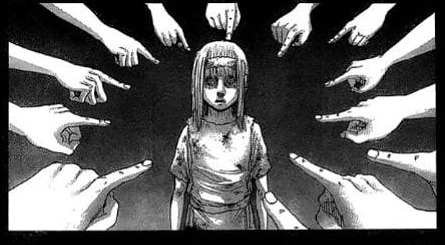

Much like Mr. Wick, Ymir goes on the run only in a much different context. John Wick, in his universe, is the most prolific assassin alive. He’s on the run, but he’s not defenseless. Ymir is a child and is defenseless. The men (and I do emphasize the grown men) that chase after her never perceive her as a threat. They’re having a sporting time terrifying and slowly killing this innocent child. Running out of energy and time, Ymir happens across a humongous tree and decides an odd hiding spot is better than none at all. Entering the base of the tree, she falls down into an unseen hole – like Alice into the looking glass – and just as she’s about to lose consciousness, she comes in contact with what can only be described as…this.
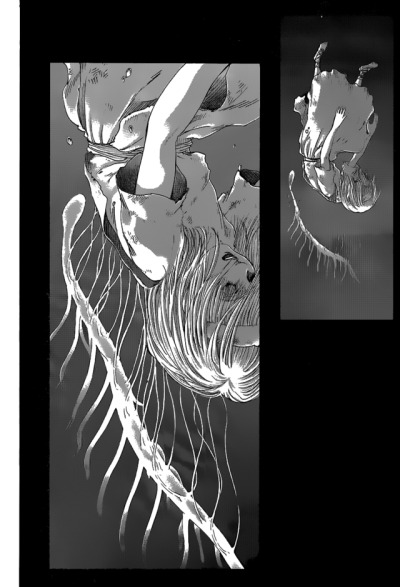
A parasite? An alien lifeform? An ancient Eldridge manifestation? Maybe. Just like another old Myth there isn’t really a clear answer nor will there be. ‘Tis the Source of all Organic Matter and it was always there it was, lad.
We get several lessons here about how history can warp our perceptions of the individual players in both a positive and negative sense. Ymir never made a deal with the Devil to get her overwhelming power. She literally fell backwards into a divot and came out big as a mountain. On the other hand, the Founding Titan was not this ethereal being of divine beauty. The First Titan was grotesque to look at. It had no true face and its ribs were exposed, which I guess makes sense for a creature that large. Founder Ymir was a victim of circumstance and oppression. She has the power of nature and God at her fingertips but has only known servitude. That’s why there is no objection when she hears the following.
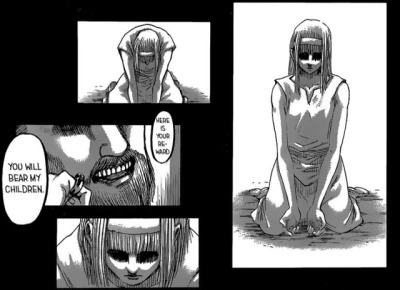
Not only is there CLEARLY no consent here, but I’m fairly sure Ymir is barely a teenager here so – Double Dose of Yikes!
Fittingly (or tragically, who can tell at this point), Ymir has three daughters: Maria, Rose and Sina. She raises her children while helping her nation conquer the lands around them with her unmatched power. However, thirteen years after her eldest child is born, a rogue soldier makes an attempt on the king’s life and Ymir leaps in front of the spear; one final act of indentured service.
Sort of. She is told correctly that she isn’t in danger. No doubt she has come back from far worse injuries than a spear to the collar. King Fritz tells her to get up and continue being a slave and Ymir says fuck you with her whole chest and gives up the ghost right there.
This shocking development leads to two things. First, we see the most graphic panel in a series full of gore and body horror as the children of Ymir are forced by Dear Old Dad to cannibalize their mother’s still-cooling corpse in order to obtain her power. Then, we see Ymir wake up in what we now know as the Paths dimension. Here she shall stay until a certain someone is able to receive and respond to her call for help.

That’s all for the backstory, now what about the source? It’s been documented well that Isayama loves myth and folklore especially of the Norse variety. Near the beginning of #122 we see Ymir fall into a tree that Momtaku and her co-host Luna succinctly describe as “both phallic and vulvic at the same time.” This seems like a clear reference to Yggdrasil, The World Tree. Yggdrasil is an interdimensional bridge with each branch connecting to a different realm, not unlike the branches we see in the PATHS dimension. Then we have the spine-like creature that latches on to Ymir like Symbiote under the tree. See if this looks familiar.

Nidhogg is a serpent that is known for eating away at the roots of the World Tree. It also has a famous rivalry with an unnamed eagle that sits atop Yggdrasil. A constant struggle between freedom and entrapment which is of course a central theme to this story. I’ve seen meta theorize that if the briny parasite represents the serpent of the Tree, that Eren Jaeger would represent the eagle the overlooks it and seeing how he’s spent most of this tale with wings on his back, that makes about as much sense as anything else.
It’s all a lead-up to Ragnarok: the End of the World.
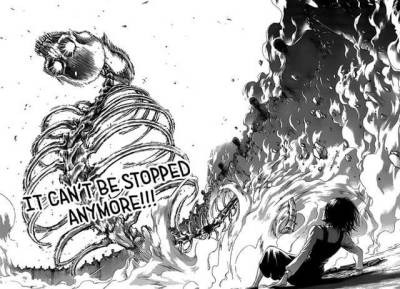
Yup, that looks like the end to me.
When the First King lined up those Titans to form those walls, he couldn’t have known someone would find the one loophole to circumvent his failsafe. The reason the Coordinate Powers only fully activate for those of Royal Blood. It isn’t because of their genes alone. Ymir is a slave to the Royal Family, even centuries after her physical death. It isn’t until someone gives her a choice that she even thinks to take a different course of action.
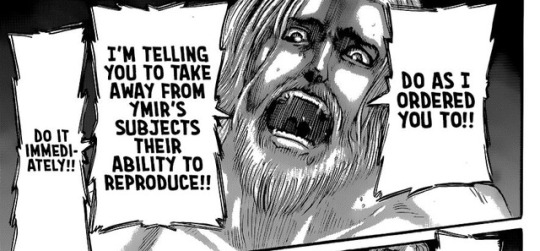
What a charmer. This panel and the one that follows are both very important to me. Zeke, in his frenzy is a spitting image of King Fritz. Yes, the are directly related but also, I think there is something to be said of him taking on the form of Ymir’s greatest oppressor. After she hears Eren’s pitch to lend him her world-shattering power we see her eyes, full of tears, for the first time. Not an accident. It’s the first time in 2,000 years anyone has treated her like a person.

This is not an official theory or anything but it’s how I interpret this. The title of this chapter ‘From You, 2,000 Years Ago’ is of great significance outside of how it mirrors the title of the very first chapter. Ymir was sending a message and when we remember the Attack Titan’s special trait of moving (and looking) forward it’s clear who the messenger was. The question then becomes, was Eren the only one who was able to answer the call? Yes, just not for the reasons you would think.
Technically, any of the Attack Titans (or any of them, I guess) could have unlocked the PATHS with enough work. The problem is, the only knowledge of Ymir’s story and the history of the Eldian people was with the Coordinate which, historically, was possessed by the Royal Line. It wasn’t until that fateful night when Grisha stole the Coordinate away that a very specific set of conditions could be met.
Once a single person of their own free will got even a glimpse of the tortured history and fate of Founder Ymir it was enough to set an incredibly complex series of events into motion. This is why the Attack Titan, even during the Great Titan War, can never listen to reason. They know what the end game is, thanks to Eren sending them snaps of that scenery.
Eren was special after all. Just not in the way we first thought. Funny that.
Stray Thoughts
- Keep in mind that the final panel of Eren’s new Titan exploding out of his severed head happens the instant it lands in Zeke’s hand. How must Gabi be feeling right now? You think you’ve slain the Devil of the Earth and all you’ve done instead is give him immense power and an army of unstoppable giants. Someone get the Bart cake gif in the replys.
- The most impressive part of seeing Ymir’s backstory is that it was largely done with no dialogue. Almost felt like we were reading a scroll or ancient tome. Credit to the author for crafting such a deep, rich world to explore. Somehow, Shingeki no Kyojin isn’t the story he’s always wanted to tell but it will rightfully be the one he is best known for.
- Once again Zeke blows a 3-1 lead by being an entitled shithead. He and the rest of his family knew the story of Ymir and the fate she suffered and still saw fit to not only keep her imprisoned but to use her as a tool to subjugate their own people. No tears from me, muchacho.
#snk meta#shingeki no spoilers#snk 122#eren jaeger#zeke jaeger#founder ymir#king fritz#congrats btw to the king#you have usurped capt gross for biggest heel in snk
32 notes
·
View notes
Text
Musings of a Writer
Written for uni coursework, I actually really enjoyed writing what was a vicarious experience of the writing process XD
---
Sat in the window-seat of their favourite coffee shop, the writer taps a pen on the notebook page in front of them, debating where to start with their latest project. The chatter behind them is enough background noise to allow them to focus, and if it gets too loud, they’ve always got headphones to drown out the worst of the noise. Finally, a spark of inspiration hits them, and they start writing out a scene of their current project. The characters start whispering their secrets, and the dialogue, though messy at first, takes form and becomes the basis for a probably emotional scene later down the line. Just got to get to that point first, after all… There was just something about writing in a café; the fact that you had the smell of coffee and food in the background, mixed in the inspiration-inducing snippets of conversation from other patrons of the coffee shop, made for a great writing session. Slipping on their headphones, the writer grins at hearing their main character’s voice crystal-clear, writing down snippets of dialogue and accompanying description. The seed was planted, and now had to carefully taken care of, so that it would bloom magnificently. But that would take time and effort, pruning any unwanted elements and letting the main idea flourish. Snippets of characters come into their head; an adventurous young prince, a demure young lady, and a stern matron-esque figure. Now, how were these lives intertwined…? The prince had a loud voice inside the writer’s head, liking to demand attention and get the most focus in his scenes. Roughed up in places, he liked to think he knew what the world had to offer—but would soon come to terms with the idea that he was utterly wrong on that front. He had some control over magic, and tended to use it to aid his misadventures. In sharp contrast, the young lady was quiet but wise. She feared the loud-mouth prince, as far as the writer could tell. No sparks just yet, but character development could turn that around. Now, what was the world like…? Looking up, the writer realises they’re out of coffee, and probably had drunk the last 10 minutes ago. Going up to the counter, they kindly ask for another hot beverage, having a conversation about the pains of university work with the lady at the till, trying to fend off the loud-mouth prince in the process in their head. Now was the time for world-building, not for character-building. Brushing back annoying strands of hair that had flopped into their face, the writer sat back down after having ordered their coffee, ready to get the rough concepts down for the prince’s world as he knew it. Was this some isolated little island, separate from the scheming of some nearby world power? And how would all this shape the plot? The young lady and her governess—the matron-figure from earlier—provided some insights that the prince couldn’t possibly provide, being adventuring in other lands. Following their guidance, the world took form—a seemingly just place that had tension bubbling right under the surface. While the prince liked to think his homeland was safe from invasion, the nearby empire had other ideas. And if that empire got their hands on this little country…the peace that the island’s inhabitants enjoyed would soon fall to pieces. -- "Oh prince, your country is in danger" Sung the blind seer, trying to guide the wayward teen before it was too late. -- Oh, is that how they met? The writer wondered, seeing an injured, startled prince turn up on the young lady’s doorstep, clearly needing somewhere to lay low until the initial roughness had passed. Though the governess tried to pry what had happened in the castle out of the prince, nothing came through until a few days after the invasion had passed and the prince felt safer. -- “It just happened so quickly, I barely had time to run. One of the invaders nearly caught me, but I got away with some injuries. No doubt that if they had kept hold of me, I would be like- like Mother and Father, or locked away.” He had whispered, looking towards the shy young maiden, searching for comfort. Before the young maiden could speak a word, her governess summed up the situation the prince was in, “And now I expect you want us to help you escape this island before they find you.” “I’m already thankful that you took me in, I can’t endanger you any more than I already have. I’ll find a way.” “How? You try to leave, their guards will spot you and drag you back!” The young maiden pointed out, “And they’ll certainly have that weird magic-sensing technology, so disguising yourself via magic won’t work.” “With all due respect, Your Highness, your tricks won’t work in this scenario. You need to lay low for a few years until you can then return. No doubt that the citizens of this great country will want the invaders to be forced out. There’s a reason resistance forces tend to work, even in small ways.” “But…” -- Oh. The loud-mouth prince had a hidden insecurity about his ability to lead. Hmm… The writer adjusted their glasses, flipping onto the next page of their notebook. This was getting interesting… Looking at their phone, they vaguely registered that they had been sitting in the window seat for around an hour and should probably be getting back home to do something else. Probably should actually get on with that essay due for next week. Okay then. Thanking the coffee shop workers, the writer left the small coffee shop and set out onto the busy city street, still somehow hearing the shy young maiden and the loud-mouth prince have a gentle conversation. Was young maiden nobility? Why did young maiden seemingly have no parents? They had so many questions for the main cast that would be answered later. Once this annoying critical essay was done. Ugh, why did they have to write about the themes some dead white guy put in his average-at-best novel anyway? Why couldn’t they just, you know, talk about more modern authors who had some interesting views on society as it was? Also, gotta find names for loud-mouth prince and shy maiden, plus a name for strict governess… Their phone made a noise, indicating that someone had messaged them. Checking their phone, the writer smiled, seeing a text from their girlfriend, happy that they would get to see each other after months apart. The writer wondered what their fantasy-loving girlfriend would make of their novel idea, and what they would point out needed to be expanded upon. They just had to plot the novel out properly, instead of having vague details of when things happened… They had a rough timeline of when the antagonists invaded and caused loud-mouth prince to go on the run, but nothing beyond that. Besides… They had so many other characters to have at least a basic design of, for later. Would the runaway prince have to flee his island, hence causing the writer to have rough idea of the surrounding empire and the citizens who lived in said empire? So much to explore… Reaching the door to their shared flat, the writer smiled, finally hearing the shy young maiden convince the loud-mouth prince to leave the writer alone for a few hours. Oh, this was going to be so much fun, developing the relationship between a sheltered young woman and a clueless prince who had so much to learn. But before they could do that, they had to push on with something more important in the present day. Saying hi to a flatmate, the writer popped in the kitchen for another drink, before heading back to their room, ready to work on the essay. Plugging their headphones into their laptop, they found their “essay-writing” playlist of music, grabbed their notes made beforehand on the author they were studying for one of their modules, and started typing away, hoping that the essay would make sense to their module tutor. The writer knew there was some, uh, improvisation in all these essays, especially for essays that were interpreting a creative text that could mean anything, but they could very well try and make something that made sense. Oh well…
4 notes
·
View notes
Note
I love learning new mythology stuff if you want to go in depth about your ideas! Admittedly I know the most about Greek mythology, so you might have to give more details on any other myths you use.
I know the most about Greek/Roman and Norse mythology and a bit from my ancient Egyptian obsession I had back in sixth grade, but I’ve dabbled just a little in Polynesian, Japanese, and Celtic mythology, as well as several folktales from around Europe and one or two Aztec myths, and I’ve been meaning to do some research on the Orisha from eastern Africa I think it is, but haven’t gotten around to it.
Anyways, I’ve been developing a bit of a complicated mythology themed universe in my head and it only gets more confusing as I add more pantheons to the list, so for right now for this explaination I’ll stick with the Greek, Norse, and Egyptian ones, and maybe touch a bit on the Hawaiian stuff, but I’m not as comfortable putting that out there because I’m not overly well read on that yet.
I’m putting a cut here for anybody that doesn’t want to read this, because it gets long and complicated, and I’m not even close to being done with it, and I’m giving you all the simplified version.
So, the beginnings of my idea started when I was reading that wonderful wonderful author Rick Riordin. Specifically a short story crossover between his Egyptian and Greek series. This got me wondering if I could possibly make any of these pantheons coexist long term.
So, I began with what I call cross-pantheon deities. These are children of gods/goddesses from different pantheons. But then I had to figure out a way that these gods could meet each other.
So, the gods of old in this universe are a magical species I call manas deva from the Sanskrit words for “invented” and “god”. They are beings that came to exist because of human belief, and are a bit more contained and limited than the traditional idea of gods, but still the most powerful beings in this universe. And now that they exist, they can go do things like screw a few mortals and dink around with the weather just for the hell of it.
So once in a while you’ll get someone, (probably Zeus if we’re being honest) hanging around a mortal pub or something disguised as a mortal, and another disguised god or goddess disguised as a mortal, and since the pantheons shouldn’t interact with each other they don’t know what to look out for and therefore don’t know they’ve made a huge mistake until the morning after when they both decide to mention oh yeah you just did the thing with a god bye.
And that’s where the cross-pantheon characters come from.
I’m still working on characters and plot, but my main characters are this guy Deon, who is a cross-pantheon son of Zeus Greek god of lightning and being a terrible womanizer, and Freja, Norse goddess of beauty, war, and uh, fertility. The other main character is his twin sister Talin, which is also his half sister. (And yeah, fraternal twins can have different biological dads, it happens look it up) Her dad is Ra, god of the sun and everybody worshiped him in ancient Egypt it was just the cool thing to do.
Our buddy Deon doesn’t like either side of his family, but he kind of depends on them because his immortality is all wonky. Norse deities stay young by eating special golden apples distributed by the goddess of youth and can be killed, whereas Greek gods are just eternally young and can’t die. Deon got an awkward combination of these traits and can’t be killed but still ages, so he has to keep both sides of his family okay with him and not run off to join the mortals or something, because he can’t die and there are complications like lost limbs that can come from that, and he keeps aging, so he needs those sweet sweet golden apples to keep looking like a fresh twenty something, because who wants to spend all of eternity with joint pain? One of his best friends, Asger, son of Aphrodite, son of Odin, has the opposite problem. He’s eternally young but can be killed.
Talin hates her dad and would like to just stay in Vanaheim with her brother and favorite cousins all the time(also she might have a girlfriend there but I haven’t invented her yet), but keeps going back to the sun and puts up with her dad because there are several people there in the realm of gods and spirits that depend on her. I’m still thinking through her motivations and backstory, but she’s shaping up to be quite dangerous. She’s loud and slightly violent and is confrontational in a good way. She believes she knows what is right and will fight for it. She and Deon make nice foils for each other because he is much quieter and shy and prefers a more sneaky or indirect approach to conflict and doesn’t see morals as something set in stone. He has charming abilities and will use his magic to get what he wants, all the while making the other person believe it was their idea. So, she’s the huntress, he’s the trickster. Neither of them are overly gorgeous by society’s standards but have the ability to trick people into thinking that they are because their mom is a love goddess. Does that make sense?
I’ve got all kinds of other side characters I’m working on. None of them are overly developed at this point, but here’s some of my more well thought out ones.
I’m calling this one Jessie for now. She/her Greek/Hawaiian. Dad is Kanaloa, Hawaiian god of the underworld and magic, mom is Kymopoleia, Greek Goddess of sea storms. You’d expect somebody with that parentage to be pretty volatile, and you’d be right. Pansexual Demigirl that’s best friends with Deon and Asger and Deon is a trans guy as of right now, but I might change that later, but anyways, Jessie and Deon first got to know each other as of right now because they both wanted a trans friend and she got to know Asger through Deon. But like I said, I’m thinking about changing a few things we’ll see how it goes.
Apollo. Yes, that Apollo. He looked away from the mirror just long enough to be one of Deon’s mentors and teach him how to shoot. This is a modern day story, so that includes guns as well as bows and arrows. Don’t get the impression he’s a good person here. He’s not. He just chooses to care about his siblings sometimes.
Asger. he/him My one straight cis character. I needed one in there. He’s the son of Aphrodite Greek goddess of love and Odin, leader of the Norse aesir gods. He became friends with Deon after finding out he also had a love goddess mom and they bonded over how their moms are both just the worst. He’s incredibly strong and people often call him if they need a giant or dragon disposed of and Thor isn’t avalible. He’s also good friends with Talin and they bond over being kind of violent. They both like weapons and fighting and whatnot. The Norse gods find them to be fun at parties.
Eric, Dalia, and Astrid. Not much of a backstory for these three yet, but they are former demigods that were made gods after the Norse deities found them useful. They deliver messages, because I noticed the Norse pantheon has a god of messengers, but they don’t have a god whose job it is to deliver messages, so I invented the story of the four messengers. One for each season. Eric son of Loki in the winter, Astrid daughter of Thor in the spring, Dalia daughter of Tyr in the fall, and Deon is the summer messenger. This is an interesting device, because all four of these characters are very powerful and useful, but one of them is missing at any given time, because during the season they work they are busy almost all of the time and the only way to get a hold of them is to deliver a message. I’ve got a whole complicated story planned out how they were all added one at a time over the course of a few centuries, but this post is getting too long anyways.
Freja. Goddess of beauty and war. She runs a house of fallen warriors that are training for ragnarok, same as Valhalla. She seems ditzy and is basically the world’s worst beauty pageant mom, but if you piss her off you will suffer a fate worse than any of the underworld gods/goddesses could imagine for you. Do not cross her. She can run in heels.
Zeus. I don’t need to talk about this guy, do I? He sucks. He just really sucks. Get him out of my face. He’s a horribly abusive parent.
Ra. Good king, bad dad. Argues with other sun gods/goddesses. Sol never has any time to talk to him because she’s being chased by a wolf. For crying out loud, Ra. Stay in your lane. Focus on your own thing. This is why you have like three cross-pantheon kids.
Yeah, those are the more developed ones. I have tons more, but I don’t think I have time to get into those.
As for what kind of plot I’d have in this context? That’s a little fuzzy. I’m thinking something like demigods and minor deities are going missing, and since the gods can’t exactly throw demigods or mortal heroes at the problem, because the problem is that they’re disappearing they send some cross pantheon gods because they’re pretty much on the lowest rung right above mortals in these godly societies and their parents don’t really care for them that much. So, it would probably follow several characters on their quest to find out what the freak is going on and why all these spirits and demigods and favored mortals are disappearing across so many pantheons.
That probably leads to all kinds of shenanigans, including various figures from these mythologies that aren’t supposed to meet crossing paths. I like to imagine a scene ending with Asger smashing in some Greek monster’s head with Mjolnir or a similar Norse weapon. Probably Typhon. Can we have Typhon, a giant monster with insane features and probably bigger than mount everest get defeated by a tap from Thor’s hammer? Please and thank you?
Anyways, it’ll probably be a very long time before I get all of my thoughts together enough to actually get a screenplay together because this is taking a lot of sorting out and it would probably be several movies long, but there’s the bare bones of my mythology themed universe for you. It all takes place in modern day, so imagining Apollo sitting on the couch eating cereal and watching the golden girls on Netflix is totally something you can do, and something I have done, obviously.
Thanks for reading all of that. It’s kind of a lot.
36 notes
·
View notes
Text
8 books on politics to read right now, from indie bookstore Politics & Prose
BY ELIZABETH FLOCK

Politics & Prose. Credit: Politics & Prose
It’s been an eventful, chaotic few weeks in politics.
How best to understand all the changes going on? At the arts desk, we often turn to books for insight and reflection. So this week, we went to our local independent bookseller, @politicsprose, for their thoughts on what to read right now. Here are eight books — both old and new — recommended by the P&P staff, who chose to focus on the themes of democracy and the power of the presidency, and on the genres of dystopian and satirical fiction. In their words:

The Plot Against America, Vintage Books
1. “The Plot Against America” – Philip Roth
In this seminal novel, Philip Roth plausibly dismantles the assumption that American democracy is too powerful to be undermined by any one individual. It’s a disturbing alternative history that begins with Franklin Roosevelt losing the 1940 election to the more authoritarian Charles Lindbergh. The narrative follows a Jewish family in Newark, warily observing that their president is more willing to cooperate with Hitler than condemn him, while anti-Semitism underlies a new brand of folksy patriotism. In a chilling demonstration of what the “tyranny of the majority” could entail, it becomes increasingly clear that “America First” (the name of Lindbergh’s party) doesn’t mean that all Americans come first.
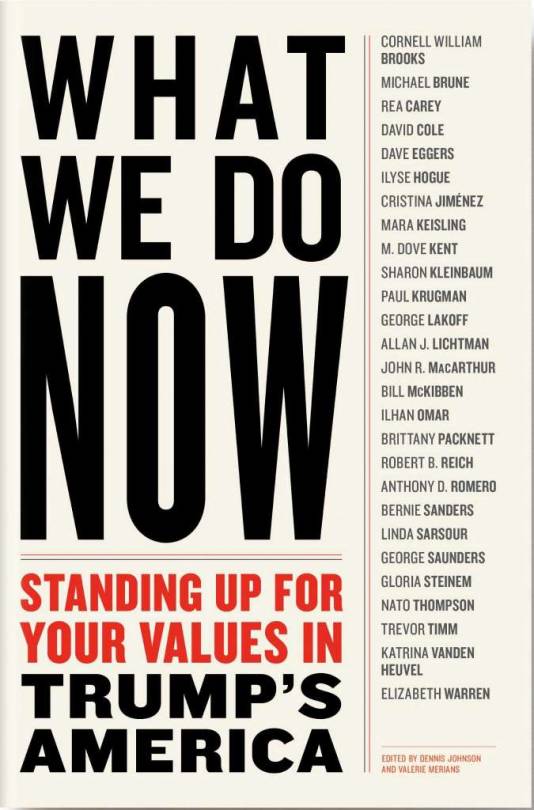
What We Do Now, Melville House Books
2. “What We Do Now” – Edited by Dennis Johnson and Valerie Merians
Released in early 2017, publisher Melville House has assembled an array of contributors for this guide to “Standing up for your Values in Trump’s America,” as the subtitle puts it. Featuring practical and heartfelt guidance from ACLU head David Cole, NAACP president Cornell William Brooks, Gloria Steinem and Elizabeth Warren, to name just a few, these brief essays collectively chart a way ahead for progressives on issues ranging from climate change to LGBTQ rights.
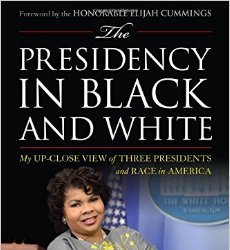
The Presidency in Black And White, Rowman & Littlefield Publishers
3. “The Presidency in Black and White – April Ryan
Author April Ryan has been diligently reporting from the White House on behalf of Urban American Radio Networks for two decades, ensuring that issues of race and racism in the U.S. could not be sidelined. Bringing a rare minority perspective to the White House Press Corps, “The Presidency in Black and White” is a candid, personal reflection on her lived experience of the Clinton years to Obama’s second term, by way of the Bush administration.
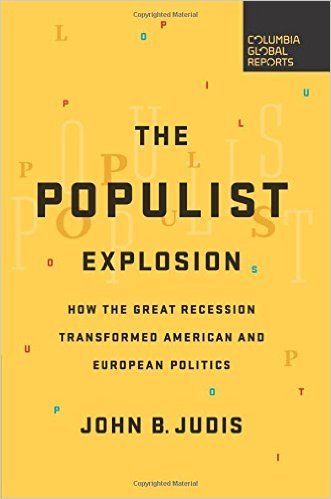
The Populist Explosion, Columbia Global Reports
4. “The Populist Explosion” – John Judis
If there’s a single message to take from Judis’ straightforward, insightful guide to our current reality, it’s that populism as a political force is here to stay, on the left as well as on the right. Written in a dispassionate tone and sticking with plain facts throughout, the former New Republic editor depicts a mood of widespread public anger and resentment toward the “establishment” in the U.S and across Europe.
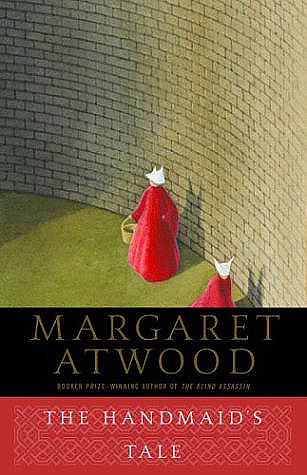
The Handmaid’s Tale, Anchor Books
5. “The Handmaid’s Tale” – Margaret Atwood
Currently enjoying a resurgence ahead of an upcoming movie adaptation from Hulu, Margaret Atwood’s dystopic sci-fi classic was also a popular reference point on protesters’ handmade signs at the Women’s March. Some see parallels to today: a society traumatized by terror falls under the sway of a brutal regime that holds to allegedly Old-Testament Christian values. In Handmaid Offred’s world, women’s rights have been relinquished for the promise of law and order, and her role is simply asa vessel to produce a baby for a powerful husband and wife. Yet even within her bleak reality, acts of resistance bring a spark of hope to those trapped in a desperate situation.
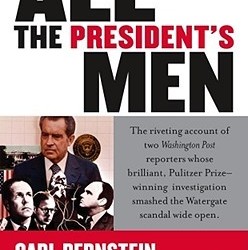
All The President’s Men, Simon & Shuster
6. “All the President’s Men” – Carl Bernstein & Bob Woodward
This is the book that brought down a president and defined its era. An extraordinary work of investigative journalism from two Washington Post reporters, “All the President’s Men” laid bare the Watergate scandal in unprecedented detail more than 40 years ago, and described the journalistic process behind headlines that, at the time, were still causing shockwaves around the world. The role played by the whistleblower known as “Deep Throat” was revealed for the first time, giving this book all the urgency of a detective thriller. President Nixon resigned shortly after its publication, and “All the President’s Men” remains the definitive example of how a determined journalist can expose the secrets of even the most powerful.
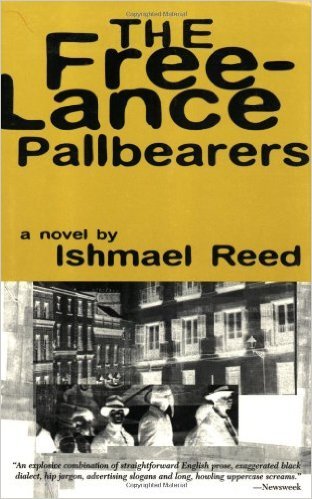
The Free-Lance Pallbearers, Dalkey Archive Press
7. “The Free-Lance Pallbearers” – Ishmael Reed
Famed satirist Ishmael Reed doesn’t pull any punches in his first novel. The eponymous kingdom of HARRY SAM is made up of a wild and contradictory jumble of black nationalists, white liberals, cops, beatniks, hippies… perhaps Reed’s trick is making a quasi-realistic depiction of mid-’60s America seem like such an outlandish proposal. The young African-American hero of the piece, Bukka Doopeyduk, must confront a chaotic society that simply doesn’t make sense. Meanwhile, for reasons never explained to the reader, HARRY SAM is both a tyrant and a grotesque used-car salesman who has been ruling his kingdom from the toilet for the past 30 years.
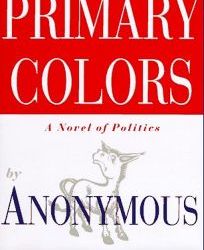
Primary Colors, Random House
8. “Primary Colors” – Anonymous (later revealed as Joe Klein)
“Primary Colors” is ostensibly a work of fiction, but nobody was fooled when this barely disguised account of Bill Clinton’s first presidential campaign — told from the perspective of an idealistic congressional aide — was published in 1996. Jack Stanton, a Southern governor, is charismatic and calculating and an outrageous flirt who’s willing to put aside personal values to take whatever stance necessary to win. This book caused quite a stir, and the identity of the author was the subject of frenzied speculation. After repeated denials, political columnist Joe Klein eventually owned up to writing a “novel” that wound up successfully (and hilariously) capturing the tone of the Clinton era.
Read the original story on the PBS NewsHour website here.
190 notes
·
View notes
Text
A Short Review and Analysis of Cybersecurity Themes and Examples Presented in the Emoji Movie
Please realize that I wrote this in 30 minutes as a class assignment. It is a pure, messy, unedited stream-of-consciousness. :D
The plot of this movie is well-described as a combination of the The Lego Movie and Inside Out. The main character is an emoji who, instead of performing his task of acting as the emoji type he appears as, switches between multiple emoji types. After destroying part of a necessary operating console to use the emoji bar in text messages, he and another emoji sneak into other app to visit a hacker to reprogram him to conform to societal norms. They then spend most of the movie attempting to move to Dropbox for plot purposes while anti-virus bots chase after them and the phone is at an increased risk of being factory reset. The main character is then captured and sent for a public execution, just before which the antagonist is stopped and the risk of a phone reset remedied. There is also a side-plot which involves two emojis dealing with marital problems under the stress of their son becoming a criminal and running from the board’s ruling and another side-plot in which two children must face communication issues in resolving their own emotions in regards to the other.
The most important takeaway from this specific movie is the unfortunate prevalence of marketing in the media created as cheap and blatant cash-grabs, seen commonly in a number of studios. These films may be based around a specific pre-existing toy or product to sell (an example of this would be The Lego Movie, or many video game movies such as the Angry Birds movie) or cash in on a pre-existing franchise (such as in many of the newer animated adaptations of Dr. Seuss stories). This movie’s plot and major themes may be tied back into the topics discussed in class through the major point of cybermarketing, as this movie (which features several prominent games and online services) was heavily advertised online using its appeal of a common object (emojis), popular music, bright coloration, and well-known games and services to draw in viewers.
This movie also, albeit briefly and somewhat inconsistently, touches on problems with online anonymity, communication issues arising in young teenagers, and the unreliability and poor education on the increased prevalence of interconnectivity, the internet of things, and the internet as a whole. One example of the problems with online anonymity and communication is in an earlier scene in which two of the main characters discuss how social media such as Facebook has led to an oversharing of personal details and a degradation of genuine reactions and real-life interactions. Other scenes include those with “troll” characters who deliberately use their perceived untouchability to verbally harass other characters. It also shows how the internet can often provide entertainment without much value, in which several characters are trapped by the draw of cat videos on Youtube. More directly related to the real-life effects, the human character who owns the phone that the film mostly takes place within has proportionately little screen time and is shown to be constantly hampered by his phone while still being unable to exist without it (having it on his desk during class, being unable to express his emotions without the use of emojis, the teacher being forced to relate to emojis to explain the concept of hieroglyphics, several students being so distracted by their phones that they walk right into each other, and malfunctions in phones having tangible real-world associated negative social effects). One app is also disguised as another out of distrust for authority figures who may look through the phone. Further communication (and privacy) issues can also be seen when the main characters are attempting to guess a password. In order to guess the password, they read over the main character’s email trash, finding what is framed as a romantic letter that was never sent (but was really just copied song lyrics instead of original writing) and using the intended recipient of the email as the password, showing the need for better education supporting secure passwords. (On a related note, the following scene shows the characters walking into the supposedly secure Dropbox but an “anti-virus bot” is then later able to break through the firewall and directly steal content out of the cloud.) another scene earlier on in the film similarly touches on how quickly common objects can be made irrelevant or mostly lacking value as emoticons are seen as frail and incapable of properly communicating in the same way that emojis can, with emoticons barely able to express words at all. Better education could also be used in scenes which attempt to draw upon existing concepts but are incorrectly executed (such as in which a character unplugs his phone during a factory reset but everything magically reappears; another character sees during this scene an odd emoji and is immediately infatuated and does not question its unordinary nature or pursue how it was created).
As a final note, this movie shows the inescapability and concern associated with illegal activities on the internet, mostly surrounding hacking, the usage of “bots”, and other concerns. Firstly, one of the main protagonists is considered a “hacker,” one of a presumably illegal group who uses a wristband to remain constantly connected to information on the phone. She is shown to supposedly have the ability to access anything unsecured, using this information to gain access to secured areas (she lists off a large amount of data she has already collected on the person whose accounts they are attempting to infiltrate) while also having supposedly removed an emoji from the phone’s system itself. This can show the amount of access that hackers can gain over nearby systems they can connect to and how unprotected but seemingly unconcerning information (such as -- as was given in the film -- preferences for food, animals, and people) can be used to profile a potential victim of hacking. Next, the usage of “bots” (formally considered anti-virus bots by the main antagonist) shows the unreliability of automation, remote work, and the ability to remove harmful content. In a fairly early scene, these bots appear to deliberately ignore a number of viruses in the area, instead focusing on a differing assigned target, showing how even normally-functional systems can be manipulated to ignore their original function. Later, one of these bots is given an “illegal upgrade” by the system supervisor in order to extend its capabilities, appearing much less concerned towards data damage or deletion and instead only attempting to destroy its target with increased ability, representing mistrust and concern in how seemingly “beneficial” but shady add-ons can oftentimes corrupt or further damage a system (earlier anti-virus bots deleted viruses and spam, while the illegally-upgraded bot was considered to be particularly ruthless and harm the continued psyche and job-mentality of other vital working emojis). In addition, the illegal upgrade is presented as being a part of the phone already, with a custom storage pedestal built into the texting app, showing how oftentimes harmful or illegal add-ons can appear to be normal and a part of the system on first glance. As for the last note on other internet concerns, a number of other anthropomorphized concepts are seen in various scenes, including viruses, trojan horses, people who pirate content (music is one example given in the film), spam emails, and internet trolls. The most prominent case of this is spam, in which one of the main characters is almost immediately roped into signing up for an offered service; additionally, internet trolls are seen to have a damaging effect on another character’s feelings of self-worth in regards to how their friends treat them.
Altogether, this made me more aware by seeing how this film highlights several problems with the internet and how we use it in modern society, as well as the general issue of how marketing is aimed to maximize profits.
A few additional thoughts from about an hour after writing:
The hacker character’s design includes a black hat, possibly a nod to her being a black hat hacker (while a “good guy,” she is first found in a shy bar and her main goal is to hack her way past a firewall to access the cloud.) Her name, Jailbreak, also refers to her actions in regards to the phone. Part of her character arc also includes a reveal of her “true” and previously unknown identity, relating to the anonymity of a hacker attacking a system and how the person behind the screen is oftentimes unknown.
Pirates, viruses, internet trolls, spam, and trojan horses all exist on the same plane of existence in the movie, being a possible nod to the clear lasting impacts that each of these may have on the websites they are present on, whether they are a portion of code or a person affecting someone else.
In fact, the entire scene with the bar is made to reinforce the dangers of certain areas online, characters even pointing out how it is hidden from authority figures and parents because they would not want their child to be using it. It shows how easy it is to be sucked into problems dealing with online threats and how viruses can easily avoid anti-virus software that is comprehensive and secure.
The bar also has each of these character using similar models or character designs to reinforce the fact that while torrenting and such may seem to lack much danger, many of these files could be hiding viruses within them.
Bonus reply after I posted this on our class forum:
“Great analysis (10/10); you explored many of the movie's implications and allusions in detail. I have not seen the movie, but from your discussion the movie seems to be somewhat humorous and full of references to modern technology, but without much psychological or philosophical depth. Some of the movie's scenes, as you described, can have benefit; the scene with the individual that was able to find a user's password by looking at a love letter both emphasizes the importance of creating a hard-to-guess password, and also relates to the forum post a few weeks ago about the data that can be gleaned by going through someone's trash (PII in trash cans may lead to the discovery of passwords). Overall, the movie sounds like it could be superficially interesting and possibly funny, but without real significance, so I would give it a 6/10.”
0 notes
Text
BLOG TOUR - Mind Virus
Welcome to
THE PULP AND MYSTERY SHELF!
DISCLAIMER: This content has been provided to THE PULP AND MYSTERY SHELF by Roger Charlie Book Tours. No compensation was received. This information required by the Federal Trade Commission.
About the Book
Robin Fox is a peace-loving professor of world religions, trying to atone for his crimes as a U.S. Army interrogator. But at a Washington prayer rally, a suspect is caught trying to disperse a rare encephalitis virus, the same one used in an attack in Iraq that Fox once foiled. A CIA agent, John Adler, asks Fox for help.
Troubled by this request, Fox consults Emily Hart, his colleague at the United States Peace Research Institute and wife of its strongest supporter in Congress. She, however, has her own troubles. Leila Halabi, a Palestinian peace educator, has disappeared on the way to Washington for a lecture tour. Fox accepts Adler’s request, in exchange for the CIA’s help in finding Leila.
Fox works with a joint FBI-CIA interrogation team, and worries that Adler’s prejudice against Muslims is clouding his judgment. The suspect eventually reveals that he is part of an international conspiracy to eradicate religion, “using one virus to cure another”.
Fox deduces that the next attack is planned for Israel during Passover. Meanwhile, Emily learns that Leila has been imprisoned in Israel, and travels there to campaign for her release. Spurred by danger to the woman he loves – although he could never admit it, even to himself – Fox boards a plane that will reach Tel Aviv before her.
By careful observation, Fox catches another suspect at Ben-Gurion Airport. Now a hero to Israel, he persuades the head of Shin Bet to release Leila and let him interrogate the suspect.
He infers that the next attack is planned for Jerusalem on Holy Saturday. Joined by Adler, he sets up surveillance at the Church of the Holy Sepulchre, but fails to prevent an explosion.
Suspecting that this attack was a diversion, Fox reinterprets his clues and concludes that the real target is the Vatican. He and Adler fly to Rome in time to catch a suspect in the act of planting an aerosol device in the dome of St. Peter’s during Easter Vigil Mass. Fox breaks her silence by intimating that her love for the group’s mastermind has been betrayed. She reveals the name by which she knows him, and gives up enough information to identify the next target: Westminster Abbey, at an Easter service with the Royal Family attending. But at the same time, he receives a menacing message: Emily has been abducted by the mastermind, who threatens to kill her if any cameras catch Fox there.
Fox goes to London, enters the Abbey in disguise, and uncovers the most elaborate strategy yet: a sleeper agent in the Abbey choir planted the virus in a fire extinguisher, and used a time-release flammable agent to make the Archbishop’s vestments spontaneously combust.
After stopping the attack, Fox roughs up the suspect but learns nothing. His escort from the Security Service takes him to question the mastermind’s mentor at Oxford. Shocked to hear how his teachings have been twisted, he gives up a name: Theodore Gottlieb. They go to Gottlieb’s house, to find him calmly awaiting them with high tea and high explosives.
After a standoff, the bombs detonate and set fire to the house. Fox, cut off from the police, has to chase Gottlieb to the room where Emily is being held hostage. Using his military training, he succeeds in seizing Gottlieb’s pistol, but his principles of nonviolence will not allow him to shoot. They struggle, Gottlieb falls, and the firefighters rescue Fox and Emily in time.
They return to Washington. Adler has promised to tell the Saudis about the final target, Mecca during the Hajj, but Fox suspects he is lying and goes to the Saudi embassy himself. A furious phone call from Adler confirms his suspicions: the CIA was planning to let the attack proceed, and use an Army-designed antiserum to blackmail the entire Muslim world.
After launching Leila’s tour, Fox and Emily walk together through the GWU campus. He yearns to tell her that, when he was sure his life was over, his only thought was of her. But discretion trumps valor, and when they say goodnight, his true feelings for her are still a secret.
Interview with the Author
What initially got you interested in writing?
I’d have to go back in time and ask my 6-year-old self; he’s the one who got me hooked on writing stories, and I haven’t been able to stop since. I finished my first novel-length manuscript in high school, and after a slight detour when I was led astray by the siren song suggesting that publishing academic papers in peer-reviewed journals would be a more prudent channel for my literary ambitions, I’m happily back on track with creative writing.
How did you decide to make the move into becoming a published author?
The time was right. I had a story inside me that wouldn’t let me rest until I shared it with the world. Did I tell it well? You can judge for yourself.
What do you want readers to take away from reading your works?
I hope they’ll take away a new perspective. This book has a religious theme, and religion, whether you’re a believer or not, affects everyone and everyone has an opinion about it. And for most people, these opinions are so strongly entrenched that you could hurl arguments at them until doomsday and never move the needle; the only chance you have of getting anyone to see an alternate point of view is through story. Wherever you fall on the scale, from firebrand evangelical to firebrand atheist, you’ll probably find something in this book to challenge you. Judging from the reviews, it will make your heart beat faster – and it might raise your blood pressure, too!
What do you find most rewarding about writing?
I love the way the story takes on a life of its own. I think writing, as an art form, is less like painting or sculpture and more like growing bonsai: you may start with a clear image of the finished product, and you can twist and trim your material into the shape you want, but it’s still a living thing, and it sometimes wants to grow in a different direction from the one you had in mind, so you have to be flexible and acknowledge that it might know better than you. There are times when a character seems to be speaking to me, suggesting something I hadn’t previously thought of. I love those moments, because it feels not so much as though I’m creating the story out of nothing, as that it’s telling itself through me.
What do you find most challenging about writing?
The difficulty of getting Time, Energy and Inspiration in the room together: they all seem to have such crazy schedules and I can rarely get more than two of them to sit down with me. Sometimes I wake up bursting with ideas, but can’t get a moment to write them down until late at night when I can barely keep my eyes open, let alone remember what the muse was whispering in my ear that morning. Other times, I’m well rested and have a rare block of free time, but the well is dry. I often resort to stealing moments throughout the day for writing – and if you piece together enough stolen moments, eventually you have a book.
What advice would you give to people wanting to enter the field?
There’s a Japanese saying: “Do the best you can and await orders from heaven.” If you have a story inside you fighting to get out, then write it, and polish it, to the best of your ability. Then, when the time is right, it will find its audience. It took years of pounding the pavement before I found my editor, but in light of world events during that time, I’ve come to feel that perhaps the story was waiting until a time when it would be most relevant. So if you ever have moments when you start to doubt your story will ever see the light of day – and I suppose every aspiring author does – don’t be discouraged. It always seems impossible until it’s done.
Is there anything else besides writing you think people would find interesting about you?
I’ve lived most of my adult life in Japan. How I got there, and what I’ve been doing there, would be the subject for a whole different interview, but in large part, I have my life in Japan to thank for this book. Living in a very secularized society helped give me the inspiration for the story, and the desire to keep some kind of connection with my homeland helped light a fire under me to write it.
What are the best ways to connect with you, or find out more about your work?
You can find out more about Mind Virus and my other works on my website: charleskowalski.com. Looking forward to seeing you there!
About the Author
Charles Kowalski currently divides his time between Japan, where he teaches English at a university, and his family home in Maine.
His previously unpublished debut novel, Mind Virus, won the Rocky Mountain Fiction Writers’ Colorado Gold Award and was a finalist for the Adventure Writers’ Competition, the Killer Nashville Claymore Award, and the Pacific Northwest Writers’ Association literary award.
Other novels and short stories by Charles Kowalski:
“Let This Cup Pass From Me” (Finalist, American Fiction Short Story Award (New Rivers Press); Honorable Mention, The Maine Review Short Story Competition)
“Arise, My Love”
“The Evil I Do Not Mean To Do”
Charles can be found at his website, and on Facebook and Twitter (@CharlesKowalski).
About the Publisher
About Literary Wanderlust
Literary Wanderlust publishes well-written novels and short story anthologies in the romance, science fiction, fantasy, mystery, and thriller genres, as well as obscure history and research topics. Visit us at www.literarywanderlust.com
BLOG TOUR – Mind Virus was originally published on the Wordpress version of The Pulp and Mystery Shelf
0 notes